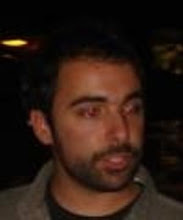
I wish you all luck on getting back into the normal swing of things. I would rather have sneaked into Gaza and joined the resistance. But hey, even my sense of adventure is limited...and hence I am back at Penn State for this semester, where I pan to continue resisting with my rhetoric and activism.
I had an awesome time in Palestine. It was certainly great to be back to the fatherland and reconnect with its land and people. The trip was indeed emotional in many ways. I am glad that I was able to go back and see first-hand the conditions over there. And what I noticed is that the past year of pro-Palestinian activism had prepared me for what to expect. For this reason, the knowledge that I acquired on this trip reinforced the convictions which I had resulting from research on the subject before going into the trip and has made me even more determined to fight for Palestine. Basically, I am more pro-Palestinian because of what I saw.
But there is indeed much hope in the future. From what I saw, I can predict that the future of the Holy Land land lies with its indigenous people. It is indeed a matter of time before the land returns to those who are a PART of it, and not those who merely live ON it.
The Israelis in power, namely the European Jew-run government, have nothing to offer but a dreary status quo full of racism and contempt for "the other." Their racist mentality, which was never welcome in that region, will be short lived and eroded by the test of time and a decrease in Western involvement and power. The typical Israeli citizen illustrates brainwashed qualities, which result in their apathy for the conditions of the occupation. All the Israeli people need is knowledge on the Palestinian situation and they will realize the madness of their government. Fortunately, many of the Israelis that I met on this trip have reached this step.
Contrasting with the comfort of the Israeli people, the suffering and hardship undergone by the Palestinians as a people, on the other hand, has allowed them to become both mobilized and enlightened, from what I have witnessed. As one resident of Dheishah refugee camp noted most wisely: The Palestinian people, despite their physical oppression, are outside the loop of media bias and hence are mentally more free than their Western counterparts (roughly quoted). This means that they have the ability to think for themselves and resulting from this, are ripe with new and progressive ideas for the development of a new and progressive society, if given the chance.
I have also noticed a general consensus among Palestinians that a one state solution is the most viable option for resolving the unfavorable conditions of occupation. After seeing all the roadblocks and checkpoints, not to mention the countless Jewish settlements in the West Bank, I have come to realize that a two-state settlement is near impossible to implement. For this reason, after the trip I am very much for a one "democratic" state solution. The Palestinian and Jewish people should take over that country from the racist elitists in power and establish a progressive state based on law which satisfies Muslims, Christians, Jews, and seculars. I may sound radical, but if you really think about it and SEE with your own eyes the backwardness of the Israeli regime, you just may come into accordance with my views and realize that they are meant in the name of progress.
A first step for the Palestinians could be as another Palestinian from Ramallah noted (again roughly quoted): Tell the Israeli government, "Alright you won, now give us our rights."
